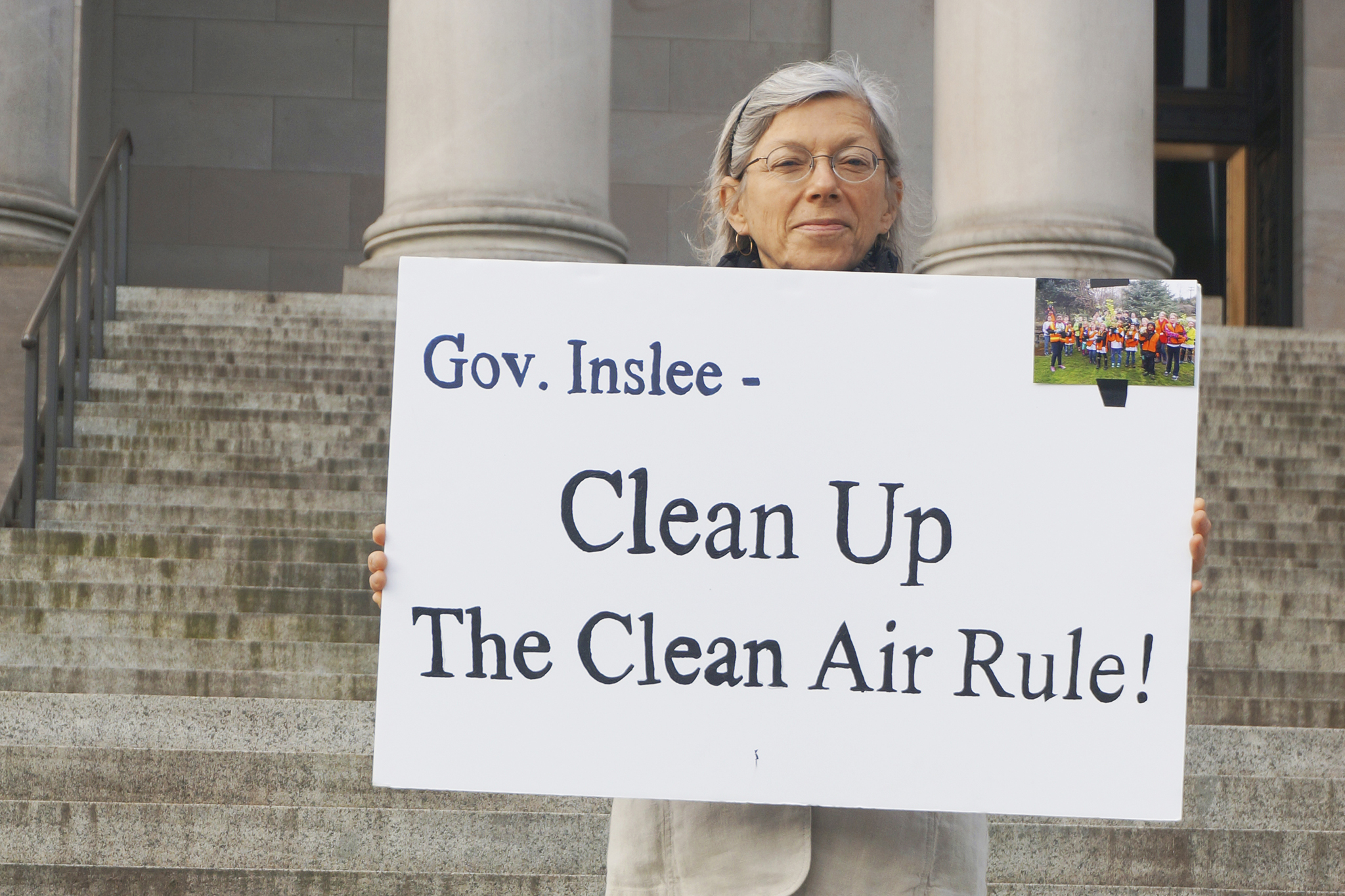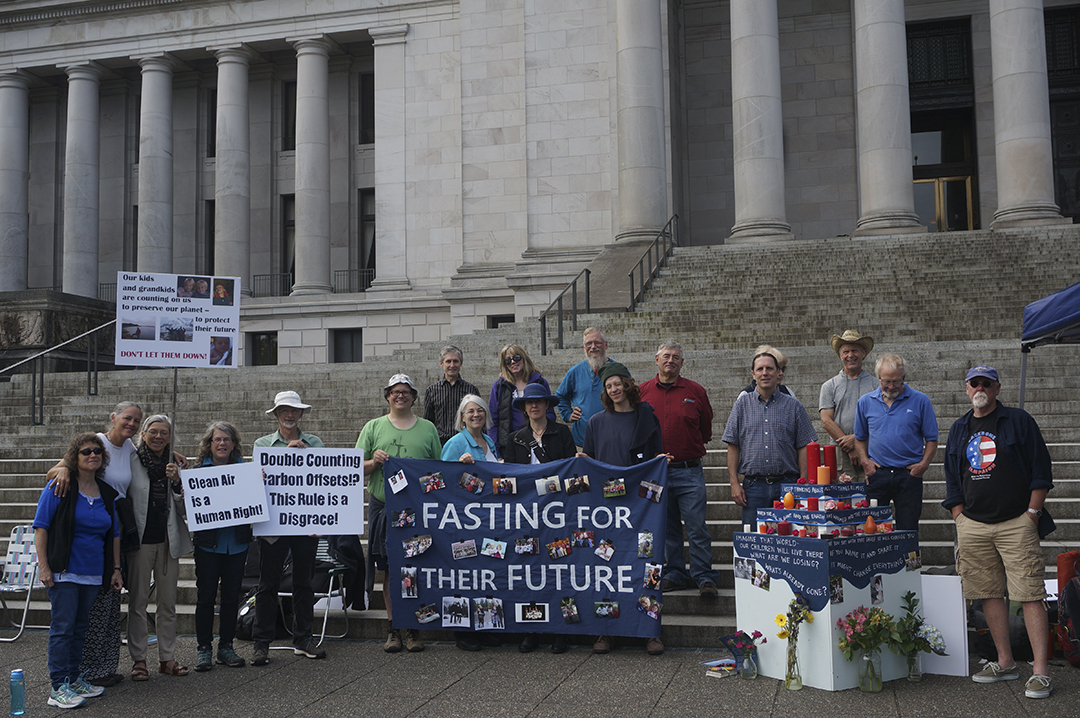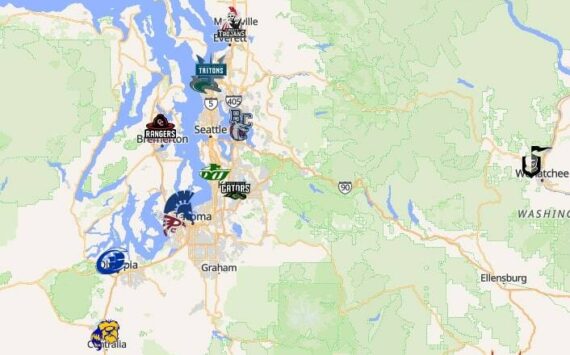“I had dinner Monday night and haven’t had anything since. … I feel a little ditsy. … I hope that I’m being at least a little bit coherent,” says Cathy Carruthers, a former economist with the Department of Ecology, while speaking on the phone yesterday from the steps of the Capitol Building in Olympia.
Carruthers is one of several dozen parents and grandparents who began a three-day hunger strike Tuesday morning to protest the Department of Ecology’s draft Clean Air Rule, which activists see as woefully inadequate in terms of combating climate change. “The rule is not enough; it goes nowhere near far enough to ensure that we’re going to live in a stable climate,” says Alec Connon, who also hasn’t eaten since Monday.
Despite a few who had to drop out of the fast for health reasons—“We’ve had two people throw up, two people who’ve had to break their fast,” Connon says—the group has maintained a quorum of about 20 fasters on the steps at all times, usually with a dozen or more additional people showing up in support. There are also six more activists participating in the fast, Connon says, just from home, rather than at the sit-in.
The aim is to draw attention to the rule in advance of a public hearing in Olympia on Thursday evening. And on Wednesday afternoon, haggard and hungry, four activists managed to snag an hour-long meeting with two high-ranking members of the Governor’s staff—his chief of staff, David Postman, and his carbon markets policy advisor, Chris Davis.
The meeting, according to the fasters, went surprisingly well. They felt heard and understood. But the reason that the rule isn’t as strong as it could be, they were told—the reason that emissions reductions look more like 1.7 percent per year, as opposed to the scientist-recommended 6 to 8 percent—had a lot to do with the constraints of state law and the fear of imminent lawsuits. While climate activists claim that the rule as it stands is ineffectual, members of the fossil fuel industry and business community (notably the Association of Washington Business) believe it has too much of an effect on their operations, and may be gearing up for a fight, no matter the outcome of these public hearings.
Carruthers, who spent 18 years working for the Department of Ecology, says that doesn’t surprise her. That was always the expectation when Ecology was drafting any kind of rule: There was always someone who was going to sue. “Oh yeah,” she says, laughing. For instance: “I had a friend call me when we were filing a forestry rule, [saying], ‘We’re all sitting here on the grass trying to figure out how much money we’re each gonna throw in to sue you.’”
As a result, she says, “I think [the Department of Ecology is] pretty much where they feel they need to be, legally. I don’t think there’s gonna be much shift.”
Environmental groups have nevertheless urged major changes to the draft, including removing a loophole that could allow companies to double-count their carbon offsets, as well as establishing stricter, “science-based limits” on emissions.
“I have kids and grandkids,” says Carruthers. “I think the time is now. I would like to see us doing a lot more than we’re doing [on climate] … a lot more than may be legally possible at this moment.”
For Deborah Woolley, fasting for the cause is particularly compelling. “It is a spiritual act, used for a political end,” she says. “That appealed to me.” And she, for one, felt very encouraged by the meeting with the Governor’s staff; it helped shift the brewing narrative for her regarding the Inslee administration’s alleged “greenwashing.”
“I have a lot of gratitude for the openness of his staff towards us—making themselves available, being willing to hear us out,” she says. “I felt a sense of camaraderie with them, actually. I have a clearer sense now of the political reality, how constrained they are by the law. Where we need to be putting our pressure is on the legislature.”
Connon agreed. “I felt they understood why we were here. They understood why we were fasting,” he says. But still: If “they feel their hands are tied, I hope that we are here to help untie their hands.”









